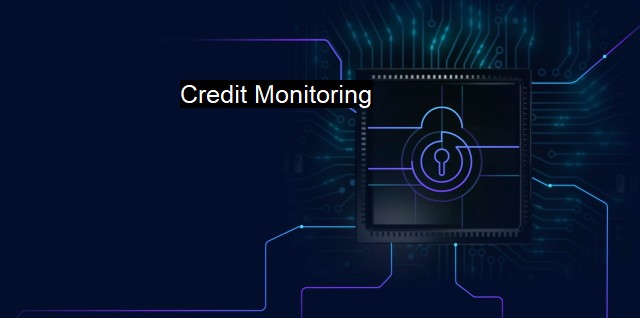What is Credit Monitoring?
Protect Your Finances and Identity with Credit Monitoring: Understanding the Key Benefits, Tools, and Features to Maximize the Potential of Credit Monitoring in Today's Cybercrime Landscape
Credit monitoring, within the realm of cybersecurity and antivirus protocols, is an indispensable tool used for the continual scrutiny and assessment of one's credit history with the objective of identifying any suspicious activities, inconsistencies, or errors that would potentially indicate deceitful actions such as fraud and identify theft.‘credit,’ diversely defined for its various contexts, refers to the data objects associated with a person’s financial reputation. This conception of credit, particularly for cybersecurity purposes, comprises crucial personally identifiable information (PII) such as Social Security Numbers, account numbers, names, addresses, and other pertinent details. Scrutiny of such assets, conducted by human expertise or software functions alike, are part of credit monitoring practices which represent safeguards for identity theft and fraud.
The rise of digital finance has also led to an increased risk of identity theft and fraud. Cybercriminals look to exploit any vulnerability in personal or corporate systems in order to steal credit data and recklessly use or sell it. Their tactics often involve widespread barging attempts, referred to as attacks, aiming at breaching digital security protections. They make use of viruses, phishing e-mails, and deceptive websites to fool individuals into exposing their private information. Herein, credit monitoring plays a profound role in cybersecurity operations against such criminals.
The process of credit monitoring begins simultaneously as threat intelligence operates for the detection of potential virus infiltration, phishing emails, untrusted connections, etc. When the threat intelligence identifies a threat, it alerts the antivirus software which either blocks the soliciting connection or quarantines infectious files, impeding any unauthorized, illegal access to credit data.
Credit monitoring incessantly inspects individual accounts for strange patterns out of the ordinary credit behavior. In such cases, immediate alerts are sent to the individual before a scam escalates into out-and-out unscrupulousness. An abnormality might be several credit checks performed in rapid succession, voluminous purchases within a short span of time, or suspicious account activities happening in unidentified geographic locations.
Many credit monitoring utilities also incorporate recovery services. If fraudulent activity is detected, they offer their users the resources and support needed to recover their identity and restore their affected credit positions. Automatic alerts warning about reports of new credit checks, the inauguration of new digest accounts, or abrupt remarkable changes in credit balances initiated by third parties could be timely lifesavers rescuing one from dire consequences.
Antivirus software and cybersecurity controls endorse credit monitoring as an integral proactive protective measure of their packet. For instance, NortonLifeLock—a renowned service for app protection, secure VPN, dark web monitoring, parent controls, protects client identity and do offer credit monitoring aids as one flawlessly woven part of their sweeping protective policy.
In a growingly interconnected world where cybercriminals are continually refining their tactics, credit monitoring emerges as a well-maintained fort, actively warding off potential intrusive threats and ensuring ultimate data protection. credit monitoring in the cybersecurity and antivirus context is an ongoing, vigilant process that examines an individual's credit profile for any signs of suspicious activities. Its ultimate goal is ensuring individuals are entirely privy to their credit situation, thereby facilitating timely intervention averting possible harm following potential data breach contingencies at any time. It is less about repairing damage caused by identity theft or credit fraud, and more about protectively preventing them.

Credit Monitoring FAQs
What is credit monitoring?
Credit monitoring is a service that enables you to keep a close eye on your credit report and score. This service monitors your credit activity to detect any unusual or suspicious activity, helping you to spot fraud or identity theft early on.How does credit monitoring protect me from identity theft?
Credit monitoring helps safeguard you from identity theft by regularly monitoring your credit report and alerting you to any suspicious activity or changes. This can include new lines of credit, credit inquiries, or changes in your personal information. By detecting these changes early on, you can take immediate action to prevent any harm to your credit score and financial well-being.What are the benefits of credit monitoring?
Credit monitoring offers several key benefits, including early detection of fraud or identity theft, real-time alerts about changes to your credit report, access to your credit score and credit report, and ongoing monitoring of your credit activity. By using this service, you can stay on top of your credit health and protect yourself from potential financial harm.Is credit monitoring worth the cost?
The value of credit monitoring depends on your individual needs and circumstances. If you are concerned about the possibility of identity theft or fraud, and want to safeguard your credit score and financial well-being, then credit monitoring may be a worthwhile investment. Additionally, some credit monitoring services offer added features such as identity theft insurance or credit counseling to provide additional value. It's important to weigh the costs against the potential benefits to determine if credit monitoring is right for you.| | A | | | B | | | C | | | D | | | E | | | F | | | G | | | H | | | I | | | J | | | K | | | L | | | M | |
| | N | | | O | | | P | | | Q | | | R | | | S | | | T | | | U | | | V | | | W | | | X | | | Y | | | Z | |
| | 1 | | | 2 | | | 3 | | | 4 | | | 7 | | | 8 | | |||||||